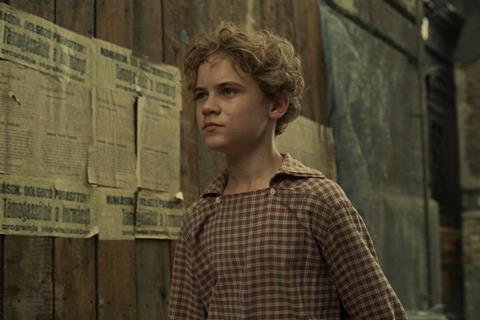Accomplished Venice competition title follows a teenage boy struggling to navigate a changing world

Dir. László Nemes. Hungary/UK/Germany/France 2025. 132mins
László Nemes’s Venice competition title Orphan could be called a coming-of-age film, but it’s just as much a coming-to-terms story – in this case, with both personal history and the turbulence of mid-20th century European experience. Inspired by his father’s childhood memories, Hungarian writer-director Nemes here maintains the psychological seriousness and the exacting formal rigour of his first two features, Holocaust drama Son of Saul and its pre-World War One follow-up Sunset.
Orphan’s immediacy should strike a chord
Yet, while those works were as much about withholding as showing, Nemes takes a much more direct approach in Orphan; a no less challenging film in its own way but one that yields more immediate appeal, even embracing the pleasures of melodrama. Orphan has sold to multiple territories, with Mubi holding rights in the US, UK/Ireland and more, and the film’s immediacy should strike more of a chord commercially than its sometimes dauntingly oblique predecessors. Its intelligent, achieved substance merits serious consideration in awards discussions.
The personal odyssey here is that of a teenage boy, Andor Hirsch (Bojtorján Barabas), growing up in Budapest in the late 50s, shortly after the quashing of the anti-Communist uprising of 1956. A prelude set in 1949 sketches in his background: a younger Andor is collected by his mother Klara (Andrea Waskovics) after he has spent several years in an orphanage. During World War Two, his Jewish father had been deported to the concentration camps, while Klara had taken refuge separately. Now Andor prays to the absent father he believes will return, while spending time with his young friend Sári (Eliz Szabó), a girl from another local Jewish family; her older brother Tamas (Soma Sándor) is on the run after the failed uprising and is hiding in a cellar (subterranean spaces are a haunting leitmotif).
Klara and Andor seem to have regained peace in Communist-era Budapest, although it is clearly not an easy place for what remains of its Jewish community. But their stability is disrupted by the appearance of a mystery figure on a motorbike, who eventually reveals himself as Berend (Grégory Gadebois), a rural butcher who helped Klara during the war. But this bumptious, sometimes brutal figure proves to have other connections with Klara, threatening her relationship with Andor and destabilising the boy’s sense of who he is.
Very much focused through Andor’s day-to-day experience, Orphan is an increasingly fraught oedipal tale in which, we sense, the personal drama of identity and alienation somewhat mirrors the condition of a nation in the throes of traumatic change; Russian soldiers appear as an intrusive presence, just like Berend once he insists on implanting himself in Klara’s household. Meanwhile, a detailed, vividly immersive picture of late 50s Budapest builds up from scene to scene, with specific meanings conveyed in fleeting details, rather than spelled out (we know that Andor’s father ran a box office, for example, but it’s only a glimpse of Hebrew lettering that suggests that it was for a now-defunct Yiddish theatre).
Márton Agh’s production design is a tour de force, the jumbled contents of a desk drawer imparting as complex a narrative as the panoramic populated views of city streets – and, by contrast with the artfully obscured depictions of Nemes’s previous films, here the filmmaker is exceptionally generous, even extravagant, with how much he shows. This is modern period drama at its most meticulous and unsparing, never indulging in spectacle or the gratuitously scenic, but conveying an acutely concrete sense of the time and milieu.
Shooting once again on film, Nemes’s regular DoP Mátyás Erdélyi makes this troubled period of Eastern European history acutely tangible, the city’s post-war condition reflected in the at times strained quality of light, often filtered through dirt-encrusted windows or projected on crumbling surfaces. Sepia tones predominate, with occasional murky semi-nocturnal blues, the drama heightened by chiaroscuros recalling the textures of post-war Eastern European cinema (e.g. Andrzej Wajda’s Ashes and Diamonds).
Prolific French actor Gadebois (recently heard gruffly voicing Michel Hazanavicius’s animation The Most Precious of Cargoes) is the most assertive presence here as the mercurial Berend. The butcher is consistently threatening, yet unsettlingly prone to flickers of seemingly benign tenderness – and Gadebois excels at modulating the character’s unpredictable nuances. Young newcomer Barabas is a find as the sometimes terrified and confused, but always defiant Andor.
Even when we seem to know exactly where Orphan is headed, Barabas’s energised alertness and ability to register Andor’s pain without overstatement keep us guessing – not least in a closing moment of suspense set on a fairground big wheel. It’s a surprisingly conventional climax that might have been unthinkable in Nemes’s previous, more narratively reticent films, but that shows this fiercely individual film-maker turning standard tropes to his own use with absolute confidence.
Production companies: Pioneer Pictures, Good Chaos
International sales: New Europe Film Sales aga@neweuropefilmsales.com / Charades sena@charades.eu
Producers: Ildikó Kemény, Mike Goodridge, Alexander Rodnyansky
Screenplay: László Nemes, Clara Royer
Cinematography: Mátyás Erdély
Production design: Márton Agh
Editing: Péter Politzer
Music: Evgueni & Sacha Galperine
Main cast: Bojtorján Barabás, Andrea Waskovics, Grégory Gadebois, Soma Sándor















![[L-R]: Amanda Villavieja, Laia Casanovas, Yasmina Praderas](https://d1nslcd7m2225b.cloudfront.net/Pictures/274x183/6/4/1/1471641_pxl_20251224_103354743_618426_crop.jpg)








